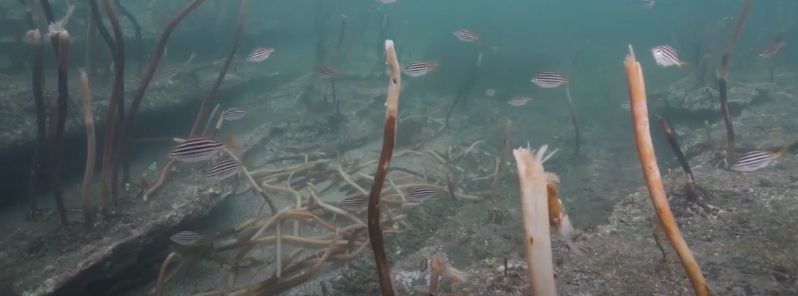Sydney’s coastal ecosystems suffer ‘once-in-a-generation’ mass mortality event, Australia

Marine ecosystems along a wide stretch of coastline in Sydney, Australia, have been devastated in recent months by a combination of bushfire debris, drought, and severe storms. Researchers for The Abyss Project, a scientific group of divers, described it as potentially the worst "mass mortality event" in decades.
To have a dry spell followed by fires and storms from February onwards was 'a once-in-a-generation event,' said Carl Fallon, co-founder of the 12-year-old project that monitors marine health near the state capital.
From the Hawkesbury River to Botany Bay, the worst affected species range from soldier crabs to urchins, soft sponges, and coral-like bryozoa invertebrates.
Invertebrate species down to as deep as 8 m (26 feet) appear to have been greatly affected by a series of changes in water quality and conditions.
Salinity has increased in shallow estuaries as freshwater inflows dropped with the dry period, then the bushfires brought additional phosphorous and nitrogen, including from fire retardants, which stimulated cyanobacteria growth.
The severe storms gave the final blow for much of the aquatic life, said Fallon. Meanwhile, sea life continues unaffected in areas deeper than 8 m (26 feet) or areas where waters easily mix, like much of Sydney Harbor.
According to Nathalie Simmonds, head of marine science at the project, the loss of foundational species may cause "feedback loops occurring throughout the entire ecosystem." Some species are recovering faster, with possibly long-lasting impacts.
At sites such as Monterey, highly-varied species previously found attached to nets and other objects submerged had started to be replaced by an unidentified algal species.
"They are all completely gone except for this one algae that has literally covered everything," Fallon stated.

Poor water quality, as well as the coronavirus pandemic restrictions, had limited scientists' ability to study the impact of this event, said Dr. David Booth, a marine ecologist at the University of Technology Sydney.
Booth added that it was very unusual to lose kelp and urchins from many areas, which are usually "two opposing forces". Kelp is typically resilient, while urchins "are pretty good at hunkering down."
Impacts on fish may take time to be evident. Some grazing species, for instance, may fare better than others, depending on the mix of plant species that return.
The Abyss Project's report noted that "climate change will see an increase in the intensity and frequency of extreme weather events," but also mitigate droughts and bushfires.
"Our observational and scientific data will provide a baseline for future researchers to enable these coastal environments to be protected for future generations."
The increasing climate stresses in the future could "just decouple everything" in the marine ecosystems around Sydney and beyond.
Booth suggested that the New South Wales government should revisit plans for a Sydney Marine Park, in wake of the previous marine destruction. The government ditched the plan in September 2018, even before the public consultation period had closed, following complaints.
"It shouldn't have dropped off the agenda," Booth said, adding the originally proposed marine park consisted of 17 sanctuary zones, covering 2.4 percent of waters around the city.
Featured image credit: The Abyss Project/YouTube

All over the world, British colonizers ignored the cultural burning of the Aborigines, resulting in devastating fires